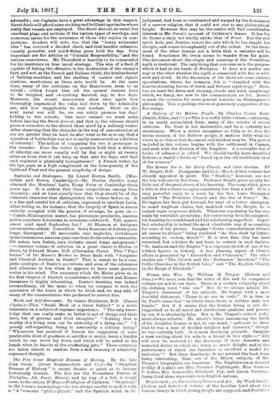CURRENT LITERATURE.
The Naval Annual. By T. Brassey. (Griffin and Co., Ports- mouth.)—It is satisfactory to think that to furnish the imposing display at Spithead we had to make no demands on the warships stationed abroad, and that with one hundred and thirty-three pennants at the Review we bad also one hundred and twenty-five pennants abroad. We are entitled to feel fairly secure, and have quite forgotten those periods when, as some fifty years ago, the home fleet consisted of a frigate, three guardships, and a few schooners. Side by side with that famous order cf Nelson's we must also put the motto, "Let things slide." Every now and then, like a careless person who falls asleep at some odd hour of the day and wakes up with a start and his heart thumping, the country gets frightened, and only a few years ago was frightened in real earnest. Most ' fortunately, too, at the cost of our pockets only; other less lucky nations would have realised their weakness at the cost of a terrible lesson. For us, se rapidly have things moved, that of the ships reviewed at the Jubilee but seven were in the lines ten years later, when in June- of this Diamond Jubilee year the Prince of Wales reviewed the effective warships in home waters ! This frenzy will stand out in history with other periods, as in the seventeenth century, when the country was convulsed by furious efforts to build more ships to fight the Dutch. Yet to most of us the process was scarcely- noticeable. And now, indeed, Admiral Colomb thinks that after all a glorified torpedo-catcher is the best ship to have. But one would be sorry to think that such beautiful ships as the Royal Sovereign' should be out of date. With regard to lines, some of the handsomest ships, it may be observed, belong to other Navies. Such are the Chili= ' Esmeralda,' perhaps the finest cruiser afloat, the French battleship Jaureguiberry,' and the Spanish cruiser Vizcaya.' We do not think the destroyers will have matters all their own way. They would be terrible enemies for an isolated battleship to meet, but to be effective against a fleet they would have to be very freely expended indeed. As yet it seems we must be content with calculating a vessel's striking energy in foot-tons in comparing it with others of its class. The old days when a 40-gun brig would sit down by a three-decker and fight till she sank or became a helpless wreck are over. For instance, the Captain of a third-class cruiser knows it would be folly to engage a first-class cruiser, say the Powerful' or the Esmeralda,' the disparity in metal is so much greater; but there will be no lack of scope for skill in handling and pluck in fighting. The fighting will be done by cruisers mostly, and isolated combats of the old' style will easily be arranged by the young sea-dogs. We say "young'. advisedly; our Captains have a great advantage in this respect. Naval duels will afford some striking and brilliant spectacles where really fast vessels are employed. The Naval Annual, as usual, has excellent plans and sections of the various types of warships, and numerous tables for the assistance of those who rejoice in com- parisons. Readers will note, too, that the "heavy armament idea" has received a decided check, and that handier ordnance, equally powerful, and quick-firing guns hold the day. Very important are the articles on "Colonial Responsibility," and the various manceuvres. Mr. Thursfield is heartily to be commended for his insistence on true naval strategy. The aim of a fleet, if capable of taking the offensive, is the destruction of the enemy's fleet, and not, as the French and Italians think, the bombardment a bathing-machines and the shelling of casinos and signal- stations, meritorious as these acts would be. At the same time, many of the criticisms on the Manceuvres seem to us trivial ; critics forget that all the several reasons have to be weighed, and everything finished, say, in five dais. Moreover, the recent manceuvres shew once again how thoroughly impractical the rules laid down by the Admiralty are, and how inapplicable to real warfare. Short as the next naval war will be, we can safely promise ten days' holiday to the schools. One more remark we must make before leaving the Naval Annual, and that is, the volume should prove a corrective to the absurd ideas aired by a military writer. After observing that the obstacles in the way of concentration at sea are greater than on land, he also went so far as to say that a squadron of battleships was not so easily manoeuvred as a division of infantry ! The notion of comparing the two is grotesque in the extreme. Does the writer in question hold that a division of infantry can move equally well by day or night at twenty miles an hour, that it can keep up that rate for days, and that each regiment is physically homogeneous A French writer, by the bye, pays us a high compliment on the homogeneity of the Spithead Fleet and the general simplicity of design.



































 Previous page
Previous page